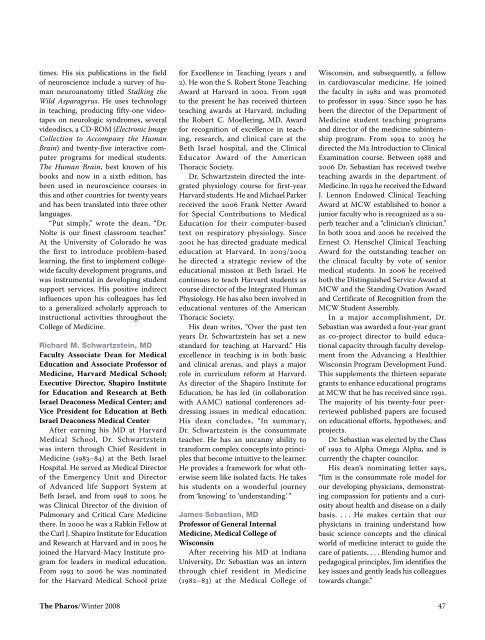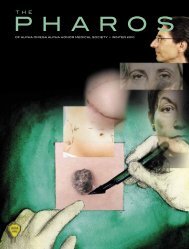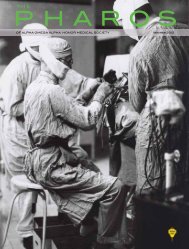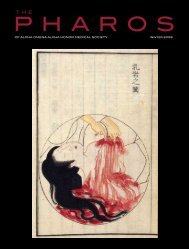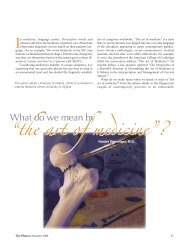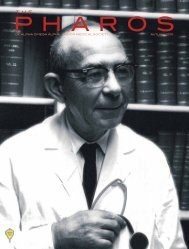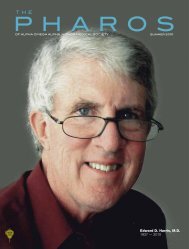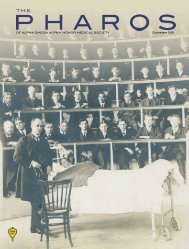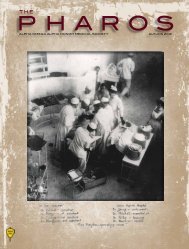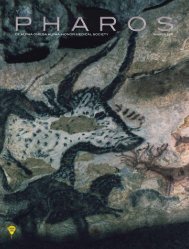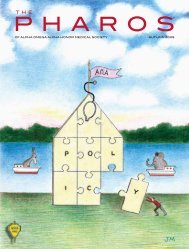Download The Pharos Winter 2008 Edition - Alpha Omega Alpha
Download The Pharos Winter 2008 Edition - Alpha Omega Alpha
Download The Pharos Winter 2008 Edition - Alpha Omega Alpha
Create successful ePaper yourself
Turn your PDF publications into a flip-book with our unique Google optimized e-Paper software.
times. His six publications in the field<br />
of neuroscience include a survey of human<br />
neuroanatomy titled Stalking the<br />
Wild Asparagyrus. He uses technology<br />
in teaching, producing fifty-one videotapes<br />
on neurologic syndromes, several<br />
videodiscs, a CD-ROM (Electronic Image<br />
Collection to Accompany the Human<br />
Brain) and twenty-five interactive computer<br />
programs for medical students.<br />
<strong>The</strong> Human Brain, best known of his<br />
books and now in a sixth edition, has<br />
been used in neuroscience courses in<br />
this and other countries for twenty years<br />
and has been translated into three other<br />
languages.<br />
“Put simply,” wrote the dean, “Dr.<br />
Nolte is our finest classroom teacher.”<br />
At the University of Colorado he was<br />
the first to introduce problem-based<br />
learning, the first to implement collegewide<br />
faculty development programs, and<br />
was instrumental in developing student<br />
support services. His positive indirect<br />
influences upon his colleagues has led<br />
to a generalized scholarly approach to<br />
instructional activities throughout the<br />
College of Medicine.<br />
Richard M. Schwartzstein, MD<br />
Faculty Associate Dean for Medical<br />
Education and Associate Professor of<br />
Medicine, Harvard Medical School;<br />
Executive Director, Shapiro Institute<br />
for Education and Research at Beth<br />
Israel Deaconess Medical Center; and<br />
Vice President for Education at Beth<br />
Israel Deaconess Medical Center<br />
After earning his MD at Harvard<br />
Medical School, Dr. Schwartzstein<br />
was intern through Chief Resident in<br />
Medicine (1983–84) at the Beth Israel<br />
Hospital. He served as Medical Director<br />
of the Emergency Unit and Director<br />
of Advanced life Support System at<br />
Beth Israel, and from 1998 to 2005 he<br />
was Clinical Director of the division of<br />
Pulmonary and Critical Care Medicine<br />
there. In 2000 he was a Rabkin Fellow at<br />
the Carl J. Shapiro Institute for Education<br />
and Research at Harvard and in 2005 he<br />
joined the Harvard-Macy Institute program<br />
for leaders in medical education.<br />
From 1993 to 2006 he was nominated<br />
for the Harvard Medical School prize<br />
for Excellence in Teaching (years 1 and<br />
2). He won the S. Robert Stone Teaching<br />
Award at Harvard in 2002. From 1998<br />
to the present he has received thirteen<br />
teaching awards at Harvard, including<br />
the Robert C. Moellering, MD, Award<br />
for recognition of excellence in teaching,<br />
research, and clinical care at the<br />
Beth Israel hospital, and the Clinical<br />
Educator Award of the American<br />
Thoracic Society.<br />
Dr. Schwartzstein directed the integrated<br />
physiology course for first-year<br />
Harvard students. He and Michael Parker<br />
received the 2006 Frank Netter Award<br />
for Special Contributions to Medical<br />
Education for their computer-based<br />
text on respiratory physiology. Since<br />
2001 he has directed graduate medical<br />
education at Harvard. In 2003/2004<br />
he directed a strategic review of the<br />
educational mission at Beth Israel. He<br />
continues to teach Harvard students as<br />
course director of the Integrated Human<br />
Physiology. He has also been involved in<br />
educational ventures of the American<br />
Thoracic Society.<br />
His dean writes, “Over the past ten<br />
years Dr. Schwartzstein has set a new<br />
standard for teaching at Harvard.” His<br />
excellence in teaching is in both basic<br />
and clinical arenas, and plays a major<br />
role in curriculum reform at Harvard.<br />
As director of the Shapiro Institute for<br />
Education, he has led (in collaboration<br />
with AAMC) national conferences addressing<br />
issues in medical education.<br />
His dean concludes, “In summary,<br />
Dr. Schwartzstein is the consummate<br />
teacher. He has an uncanny ability to<br />
transform complex concepts into principles<br />
that become intuitive to the learner.<br />
He provides a framework for what otherwise<br />
seem like isolated facts. He takes<br />
his students on a wonderful journey<br />
from ‘knowing’ to ‘understanding.’ ”<br />
James Sebastian, MD<br />
Professor of General Internal<br />
Medicine, Medical College of<br />
Wisconsin<br />
After receiving his MD at Indiana<br />
University, Dr. Sebastian was an intern<br />
through chief resident in Medicine<br />
(1982–83) at the Medical College of<br />
Wisconsin, and subsequently, a fellow<br />
in cardiovascular medicine. He joined<br />
the faculty in 1982 and was promoted<br />
to professor in 1999. Since 1990 he has<br />
been the director of the Department of<br />
Medicine student teaching programs<br />
and director of the medicine subinternship<br />
program. From 1994 to 2003 he<br />
directed the M2 Introduction to Clinical<br />
Examination course. Between 1988 and<br />
2006 Dr. Sebastian has received twelve<br />
teaching awards in the department of<br />
Medicine. In 1992 he received the Edward<br />
J. Lennon Endowed Clinical Teaching<br />
Award at MCW established to honor a<br />
junior faculty who is recognized as a superb<br />
teacher and a “clinician’s clinician.”<br />
In both 2002 and 2006 he received the<br />
Ernest O. Henschel Clinical Teaching<br />
Award for the outstanding teacher on<br />
the clinical faculty by vote of senior<br />
medical students. In 2006 he received<br />
both the Distinguished Service Award at<br />
MCW and the Standing Ovation Award<br />
and Certificate of Recognition from the<br />
MCW Student Assembly.<br />
In a major accomplishment, Dr.<br />
Sebastian was awarded a four-year grant<br />
as co-project director to build educational<br />
capacity through faculty development<br />
from the Advancing a Healthier<br />
Wisconsin Program Development Fund.<br />
This supplements the thirteen separate<br />
grants to enhance educational programs<br />
at MCW that he has received since 1991.<br />
<strong>The</strong> majority of his twenty-four peerreviewed<br />
published papers are focused<br />
on educational efforts, hypotheses, and<br />
projects.<br />
Dr. Sebastian was elected by the Class<br />
of 1992 to <strong>Alpha</strong> <strong>Omega</strong> <strong>Alpha</strong>, and is<br />
currently the chapter councilor.<br />
His dean’s nominating letter says,<br />
“Jim is the consummate role model for<br />
our developing physicians, demonstrating<br />
compassion for patients and a curiosity<br />
about health and disease on a daily<br />
basis. . . . He makes certain that our<br />
physicians in training understand how<br />
basic science concepts and the clinical<br />
world of medicine interact to guide the<br />
care of patients. . . . Blending humor and<br />
pedagogical principles, Jim identifies the<br />
key issues and gently leads his colleagues<br />
towards change.”<br />
<strong>The</strong> <strong>Pharos</strong>/<strong>Winter</strong> <strong>2008</strong> 47


